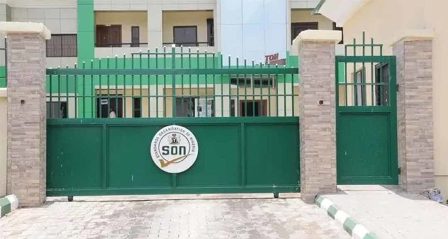Business
SON Lauds Firm For Promoting Local Content, Employment

The Standards Organisation of Nigeria (SON) has lauded Life Mate Group for producing products with locally sourced materials that drive the local economy, create more employment opportunities, and improve the living conditions of Nigerians.
Director-General of SON, Farouk Salim stated this at a press conference to launch the Lifemate 2022 Hot sales and pre-sales mode at the weekend in Lagos.
Salim, who was represented by the State Coordinator of SON, Moshood Shittu said the company, with its various range of products manufactured locally, has also contributed to the state and federal government through its personal and company income tax.
“This company has been in existence for about 20 years and it used to be that furniture was imported into Nigeria and because of the shipping cost that ultimately leads to the increase in the cost of the product, the company decided to go into local production to eliminate these barriers.
“We are glad that the company is making use of local raw materials in its production. This is creating jobs for our teeming population.
“Lifemate has contributed to the reduction of unemployment by recruiting staff locally and thereby contributing to the socioeconomic development of Nigeria,” he said.
Salim noted that the company has been subjected to the Mandatory Conformity Assessment Programme (MANCAP) certification scheme, as their products have been certified.
Regional Manager, Life mate group, Lekki, Jessica Xiong, while giving the business model, said the company is one of the foreign investors that source raw materials locally as well as produce the product locally to provide employment for the people in the country.
She said this has also helped in eliminating the high cost of shipping raw materials and the furniture into the country, which is why the products are affordable.
Xiong listed the company’s multiple categories of furniture ranging from office, home, kitchen and sanitary wares, indoor and outdoor to suit the demands of the Nigerian populace.
She said the company’s hot sale model is to ensure the products are affordable, while considering the economic situation of the country as well as ensuring people live in comfort in their homes.
The Showroom Manager, Amaka Chiemena, said the model of the furniture is to improve customers’ loyalty as well as the furniture industry in the country.
She said the company produces furniture to suit the taste and needs of the Nigerian populace at an affordable cost for the customers to appreciate.
Business
Two Federal Agencies Enter Pack On Expansion, Sustainable Electricity In Niger Delta

Business
Why The AI Boom May Extend The Reign Of Natural Gas

Business
Ogun To Join Oil-Producing States ……..As NNPCL Kicks Off Commercial Oil Production At Eba

-

 Politics4 days ago
Politics4 days agoAPC Releases Adjusted Timetable For Nationwide Congresses, Convention
-

 Sports1 day ago
Sports1 day ago2026 WC: Nigeria, DR Congo Awaits FIFA Verdict Today
-
Sports4 days ago
DG NIS Wants NSC Board Constituted, Seeks Increased In Funding
-

 Business4 days ago
Business4 days agoCustoms Seek Support To Curb Smuggling In Ogun
-

 Featured4 days ago
Featured4 days agoINEC Proposes N873.78bn For 2027 Elections, N171bn For 2026 Operations
-

 Sports4 days ago
Sports4 days agoSWAN Rivers Set-up Five Functional Committees
-
News4 days ago
Police Bust Kidnapping Syndicate In PH
-
Sports4 days ago
NSC Disburses N200m Training Grants To 26 Athletes

